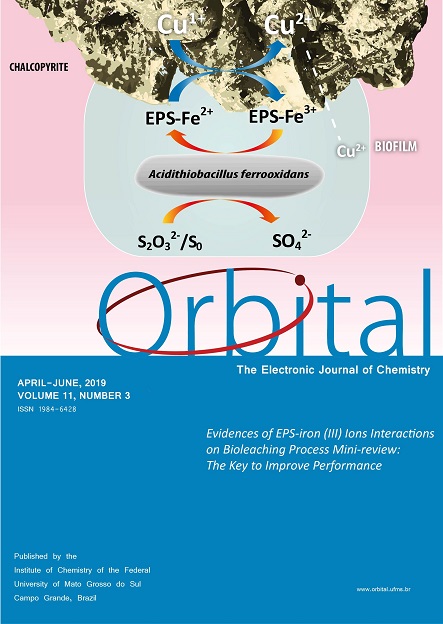Fatty Acid Content, Oxidation Markers and Mercury in Fish Oil Supplements Commercialized in Brasília, Brazil
- omega-3,
- peroxide value,
- anisidine value,
- heavy metals
Copyright (c) 2019 Orbital: The Electronic Journal of Chemistry

This work is licensed under a Creative Commons Attribution-NonCommercial-NoDerivatives 4.0 International License.
Abstract
Fish oil supplements are good sources of eicosapentaenoic (EPA) and docosahexaenoic (DHA) acids, which are important in the prevention and treatment of hypertriglyceridemia. The purpose of this study was to examine the content of EPA and DHA, oxidation markers and mercury of fish oil supplements marketed in Brasilia, Brazil. Fatty acid contents were determined by gas chromatography using internal (C23:0) and external methyl ester standards. For this analysis, samples were prepared by alkali-catalyzed methylation with boron trifluoride (14% in methanol). Mercury was determined by direct vapor detection method. Oxidation markers were evaluated by measuring peroxide value (PV), anisidine value (AV) and by calculating TOTOX. The adequacy of EPA and DHA ranged from 75.9 to 105.1% and from 88.9 to 137.4%, respectively, compared to the information in the label. Mercury concentration was above limit of quantification levels, between 11 and 15 mg/kg in 14.4% of the products. Twenty percent of the products exceeded recommended levels of PV and TOTOX. Despite the high percentage of adequacy of the parameters analyzed, about 2/3 of the products showed some inadequacies according to the law. These data deserve concern due to the potential side effects of oxidized and contaminated fish oils to their proclaimed health benefits. This survey shows the relevance of constant monitoring of fish oil quality, considering current legislation and scientific advance.


